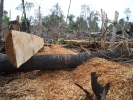 Indonesia’s legal system is failing to act against timber criminals, according to to the local NGO Kaoem Telapak and the British research team of Environmental Investigation Agency. As a result, the country’s top-level efforts to tackle illegal logging and deforestation is seriously undermined. A new research released today, Criminal Neglect, reveals that enforcement action through the courts was taken against only a handful of companies out of more than 50 investigated which were proven to have either traded directly or indirectly in illegal timber.
Indonesia’s legal system is failing to act against timber criminals, according to to the local NGO Kaoem Telapak and the British research team of Environmental Investigation Agency. As a result, the country’s top-level efforts to tackle illegal logging and deforestation is seriously undermined. A new research released today, Criminal Neglect, reveals that enforcement action through the courts was taken against only a handful of companies out of more than 50 investigated which were proven to have either traded directly or indirectly in illegal timber.
In one shocking case, Indonesia’s Supreme Court actually returned $1.6m worth of illegally acquired timber to a criminal found guilty of trading it and who had been given a jail sentence.
The report is a forensic analysis of enforcement actions and court cases between 2018-20 involving companies and company directors prosecuted for trading illegal timber.
It found that courts are routinely ignoring guidelines and rules, such as the 2008 Law on Public Information Disclosure, and are operating in a manner which is both secretive and fails to meet the court system’s legal obligations.
“This lack of transparency, coupled with some seemingly irrational decisions by various courts, leads to the concern that many criminals are going unpunished or are having their punishments reduced with no explanation from the courts.” said David Gritten of EIA.
In recent years, the Government of Indonesia has been making significant efforts to stop illegal logging and its associated trade, led by the Directorate General of Law Enforcement (DG Gakkum) under the Ministry of Environment and Forestry (MoEF). But once forest crime cases reach the courts, inexplicable stumbling blocks and failings become apparent in the way cases are handled, including:
- companies found guilty of trading in illegal timber are still allowed to retain their legitimate chain of supply/custody certificates;
- companies remaining in business despite being found guilty of dealing in illegal wood and ordered to cease trading;
- court verdicts which by law should be made public and yet are kept secret;
- hardly any action taken against named directors of companies found guilty of trading in illegal timber.
In October 2019, Sorong District Court sentenced Ming Ho to five years in prison and fined him IDR 2.5 billion ($178,200), decisions upheld by the Jayapura High Court the following December.
However, in July 2020 the Supreme Court reduced his jail time to two years and ordered that as much as 1,936m3 of the illegal timber be returned to him, valued at about $1.6 million and of significantly greater worth than his fine.
However, in July 2020 the Supreme Court reduced his jail time to two years and ordered that as much as 1,936m3 of the illegal timber be returned to him, valued at about $1.6 million and of significantly greater worth than his fine.
Elsewhere, more than 50 companies clearly implicated by the DG Gakkum crackdown in trading illegally logged merbau, principally used in parquet flooring and staircases, have not been sanctioned.
EIA and Telapak have asked the relevant authorities why there have been so few prosecutions, why companies are still allowed to operate and why court verdicts have remained secret; to date, there has been little satisfactory response.
“It is frustrating that Ministry team is doing so much to crack down on those trading in illegal timber, while it seems that the courts are undermining so much of the work” said Abu Meridian, of Telapak. “The Ministry of Environment and Forestry deserve significant praise for their efforts to stop illegal logging, but we still need to highlight the failures – not only in the courts, but also the continuing weaknesses in the country’s timber legality assurance system.”
“It is frustrating that Ministry team is doing so much to crack down on those trading in illegal timber, while it seems that the courts are undermining so much of the work” said Abu Meridian, of Telapak. “The Ministry of Environment and Forestry deserve significant praise for their efforts to stop illegal logging, but we still need to highlight the failures – not only in the courts, but also the continuing weaknesses in the country’s timber legality assurance system.”


